St Helens chief Paul Wellens delivers verdict on Challenge Cup format with FA Cup comparisons made

St Helens head coach Paul Wellens
Paul Wellens is a lifelong Manchester City fan. He’s seen the Cityzens knocked out of the Football League Trophy by Mansfield Town, and now gets to watch Pep Guardiola’s side embrace the ‘Goliath’ tagline in pretty much every cup game they go into. Like most, he loves the ‘romance of the cup’, but as St Helens’ head coach, for the sake of his players, he wants the Challenge Cup to stay as it is, even if that removes some of the competition’s appeal.
Wellens – who last year watched City see off three Championship teams en-route to lifting the FA Cup and eventually the treble – won the Challenge Cup three times in his own playing days, winning the Lance Todd Trophy in back-to-back years, one of only two men to ever achieve that feat.
Indeed, Saints have lifted the Challenge Cup 13 times as a club, with only Leeds Rhinos (13) & Wigan Warriors (20) having more success in the competition’s 128-year history to date.
The Red V begin their quest for 2024 cup glory as they take on Leeds in the Sixth Round of the competition this Friday night, returning to Headingley just seven days after the pair’s first Super League meeting of the campaign at the same venue.
Elsewhere, Warrington Wolves also face London Broncos for the second week running.
READ NEXT: Challenge Cup Sixth Round details – Broadcast coverage, dates and kick-off times of all eight ties
St Helens chief Paul Wellens delivers verdict on Challenge Cup format with FA Cup comparisons made
A rematch happening so soon is – undeniably – a result of the draw for the Challenge Cup having just four non-Super League teams in it.
That’s been the case since 2021, and with top flight teams entering at Round 6, they have to win just four games to lift the cup.
Compare that to football, and we know it’s a different game entirely, but Wellens‘ beloved Sky Blues have to win six games to triumph in the FA Cup once they enter at Round 3 with 31 other teams still involved at that point.
And while he enjoys seeing City go up against teams from outside of the Premier League, Wellens remains fine with facing fellow Super League clubs for the time being.
He told Love Rugby League: “There’s one side of it that’s the rugby league romance side where if Super League sides came in a bit earlier, you’d have more of those fixtures against Championship teams and it’d be a bit like the FA Cup feel where you’ve got the minnows going up against the giants.
“But I’m a huge believer in us trying to reduce the amount of games that the players are playing, and that lends to Super League teams coming in later in the competition.
“I understand the argument from both sides, and we seem to have tried every which way over a good number of years now by moving the Challenge Cup final date and different things like that.
“I’m a huge fan of the Challenge Cup competition, it’s one that’s steeped in the greatest history. I believe it really does add value to rugby league over here, but if I had to put my hand out, I’d say – as a coach – that I’m comfortable with where we’re at with it at the moment.”
READ NEXT: St Helens boss Paul Wellens provides injury latest on Tommy Makinson and Curtis Sironen
Wellens has say on match limits among Challenge Cup format discussion
The Saints chief is far from alone in his pleas for the amount of games per season to be lowered.
At the beginning of this campaign, ‘match limits’ were introduced by the RFL, with restrictions imposed around the number of games/minutes a player can play dependent on their position and age.
Wellens continued: “It’s obviously a challenge for the game moving forward. I’m a firm believer that we should have a plan as a game over say five years where we’re reducing the amount of games so we don’t have to place limits on players’ times.
“That’s where we are at the moment though, and I understand the reasons why we do play as many games as we do, but there’s certainly benefit in having some foresight as a game in how we can reduce it moving forward.
“If and when that happens, it will help the product on the field as well.”
READ NEXT: Explainer – How the RFL’s rules on ‘match limits’ capping players’ game-time work